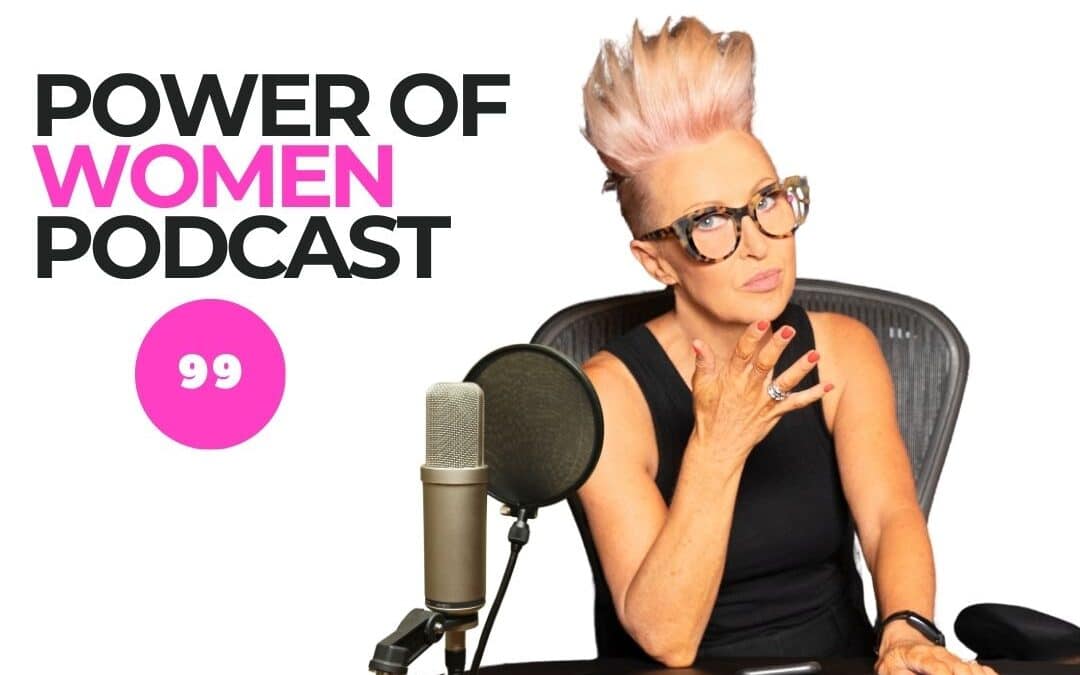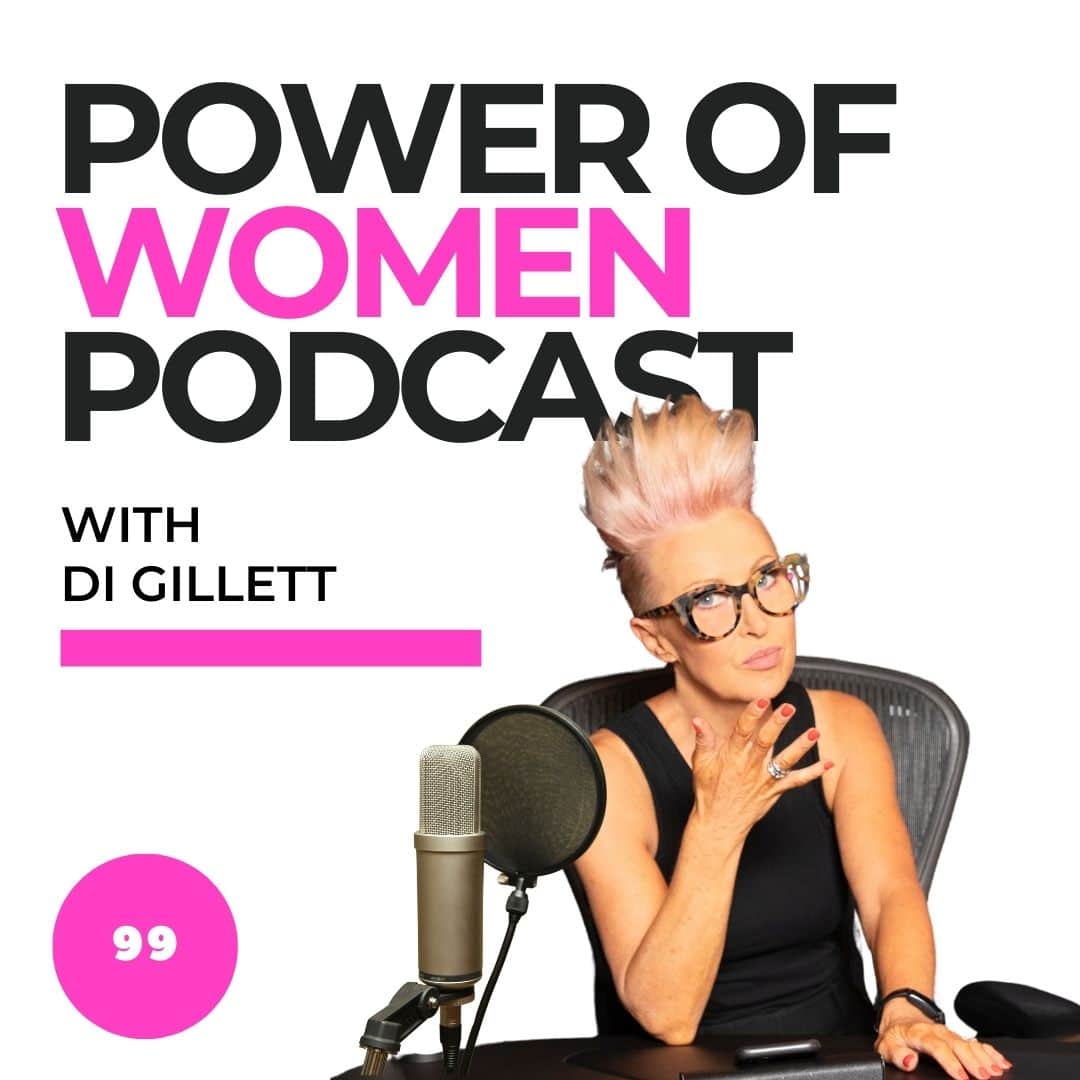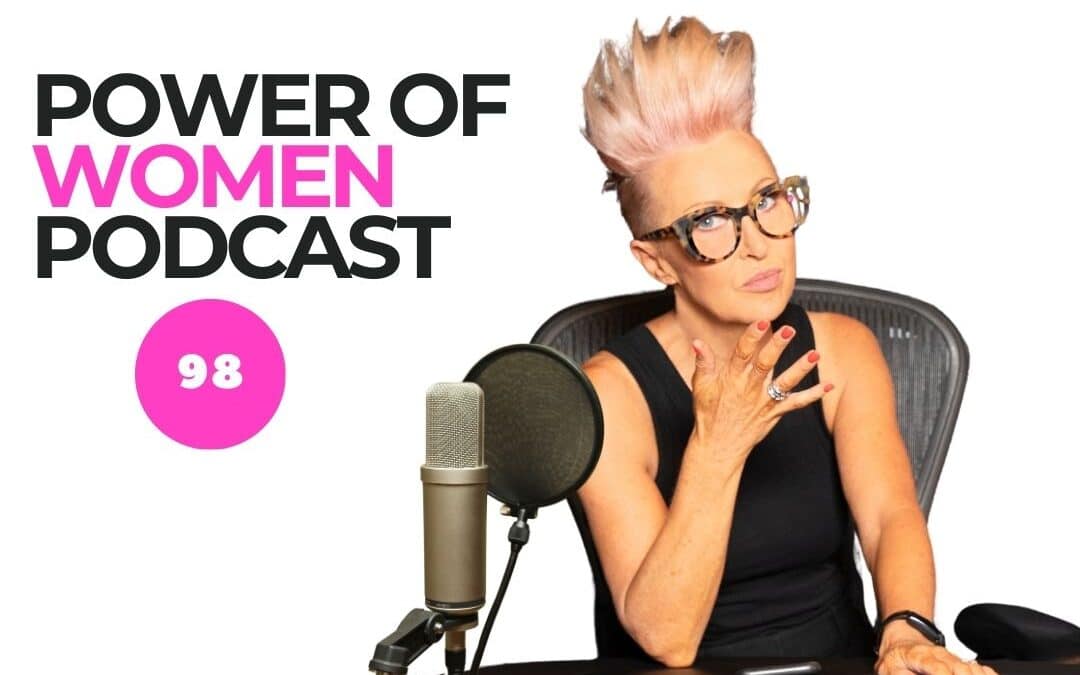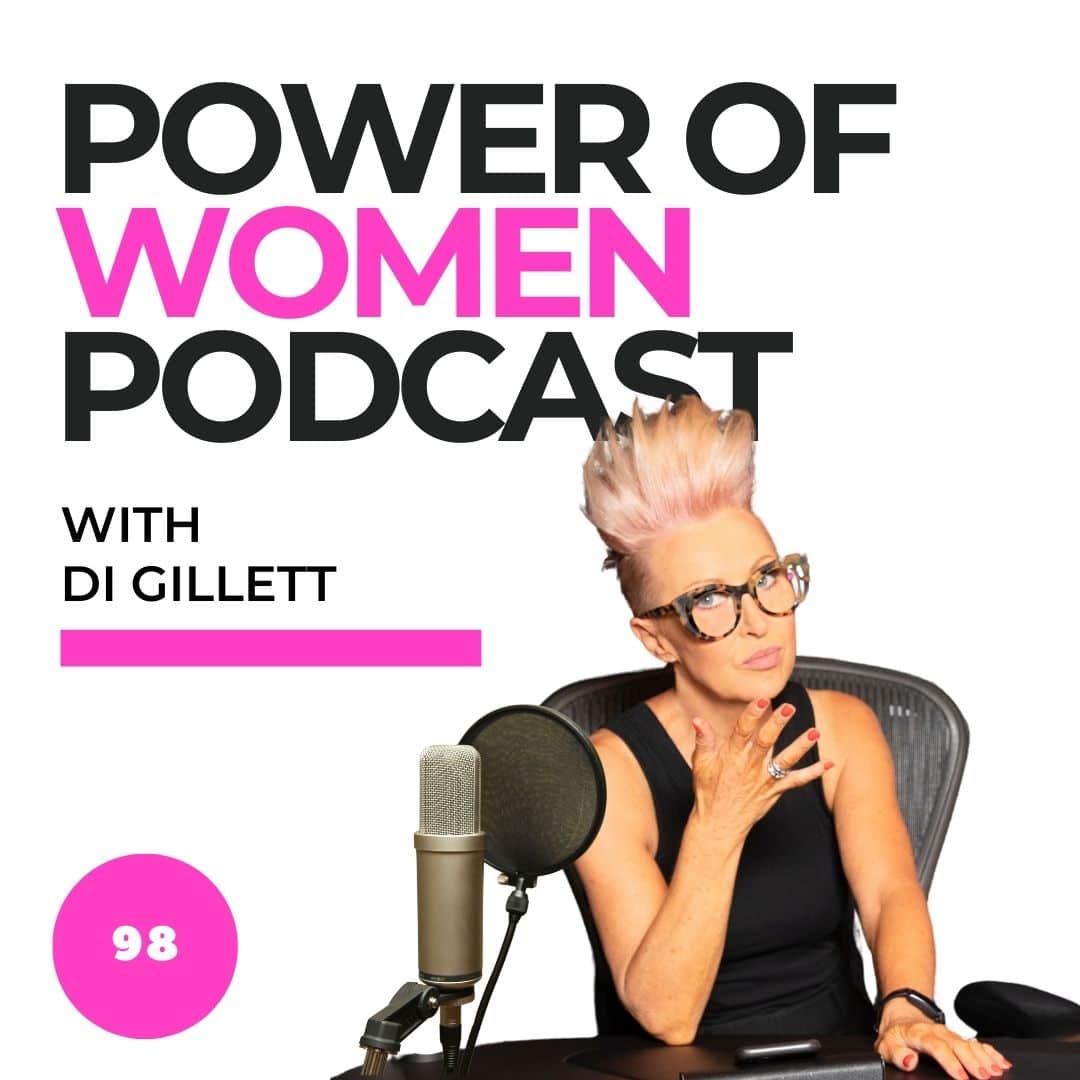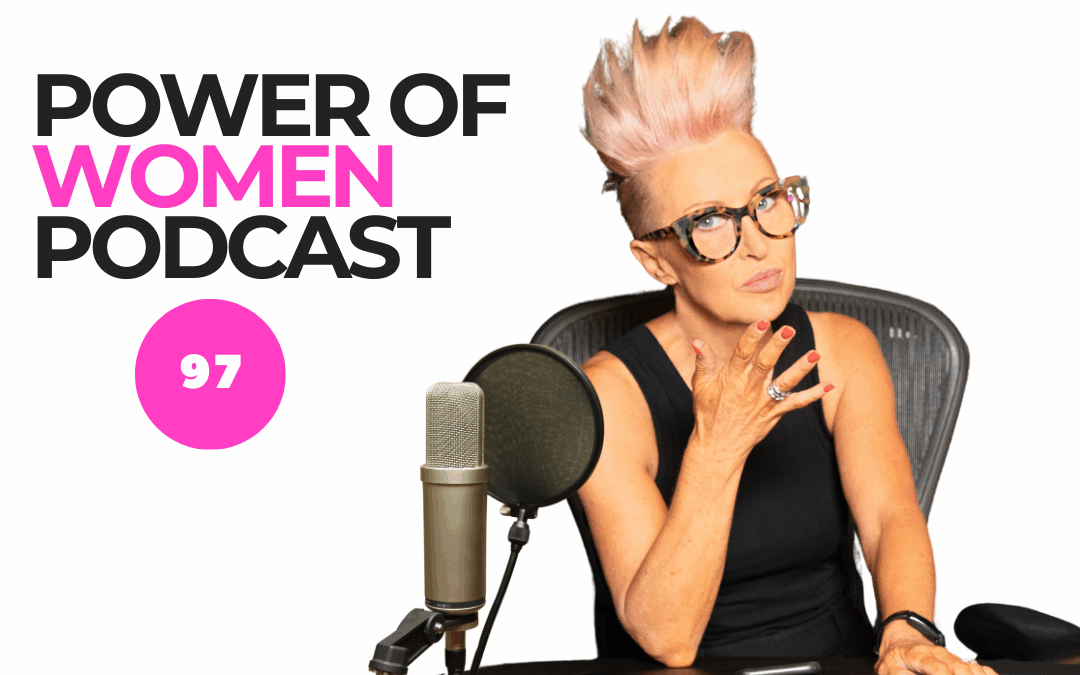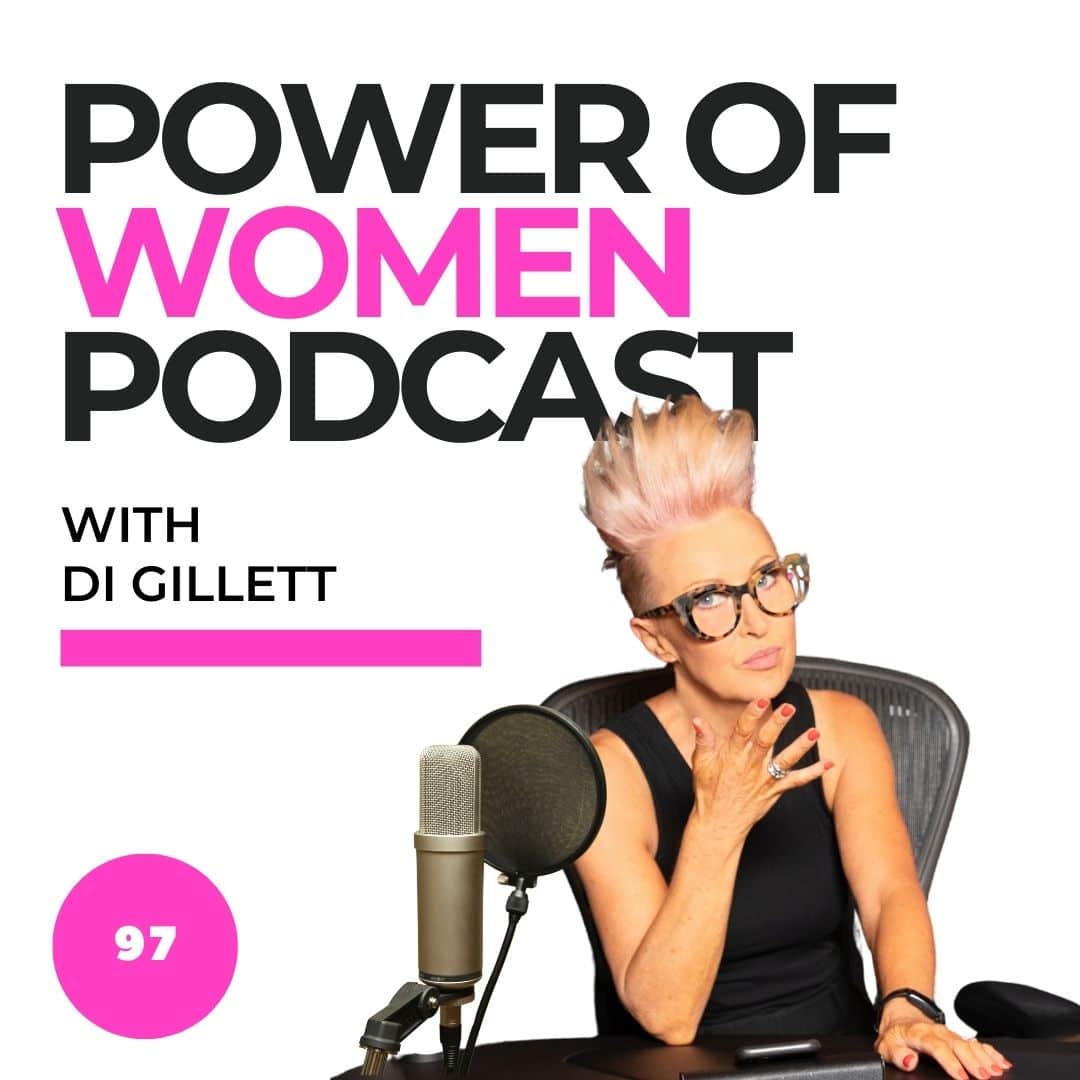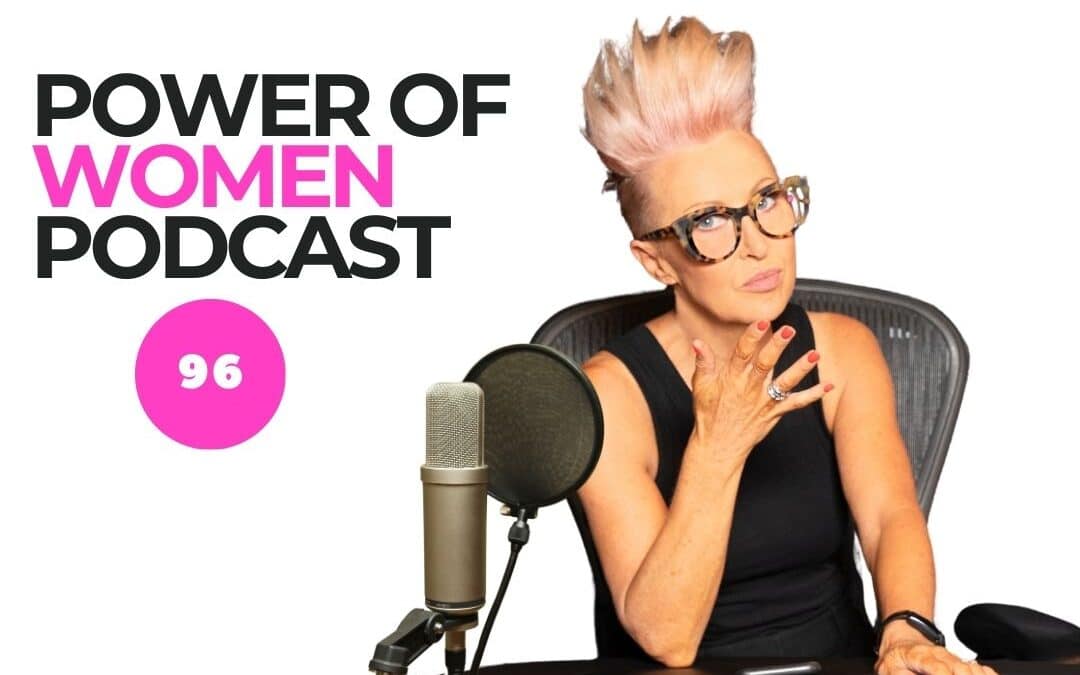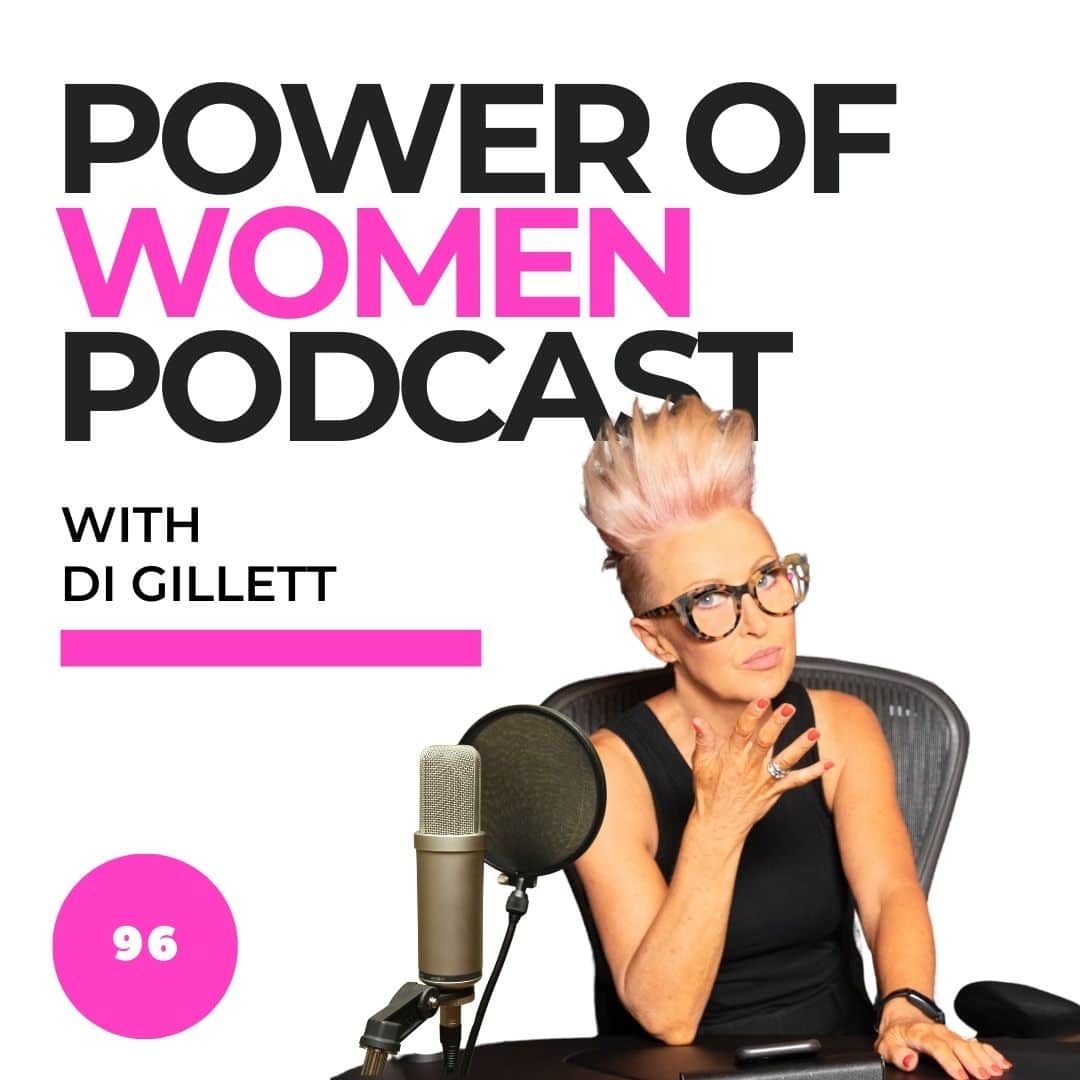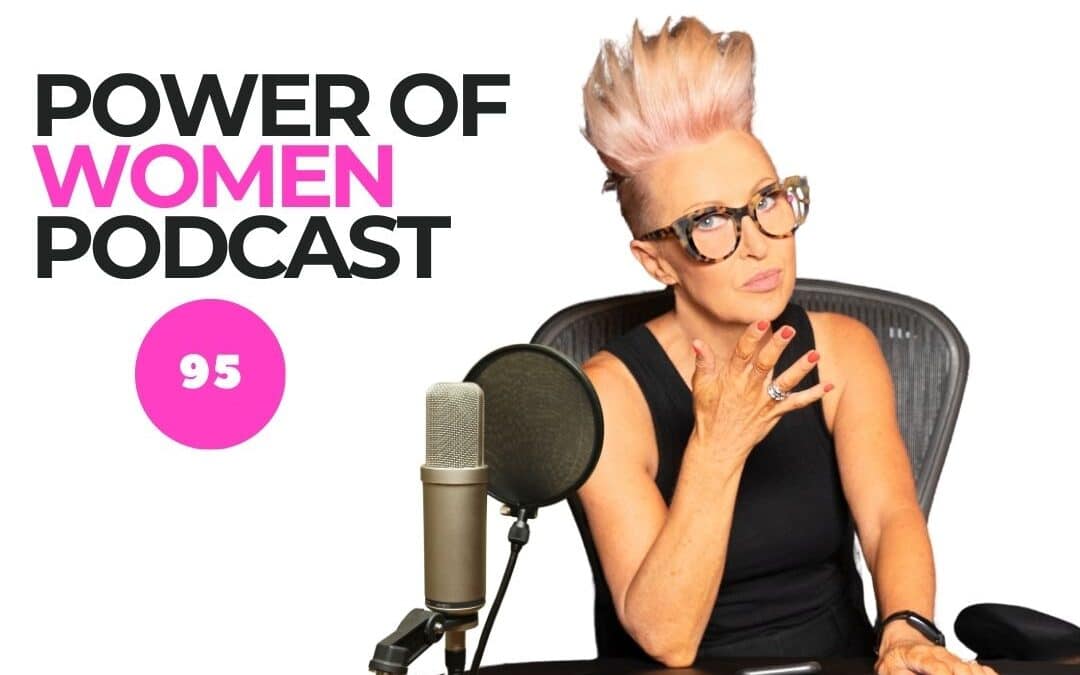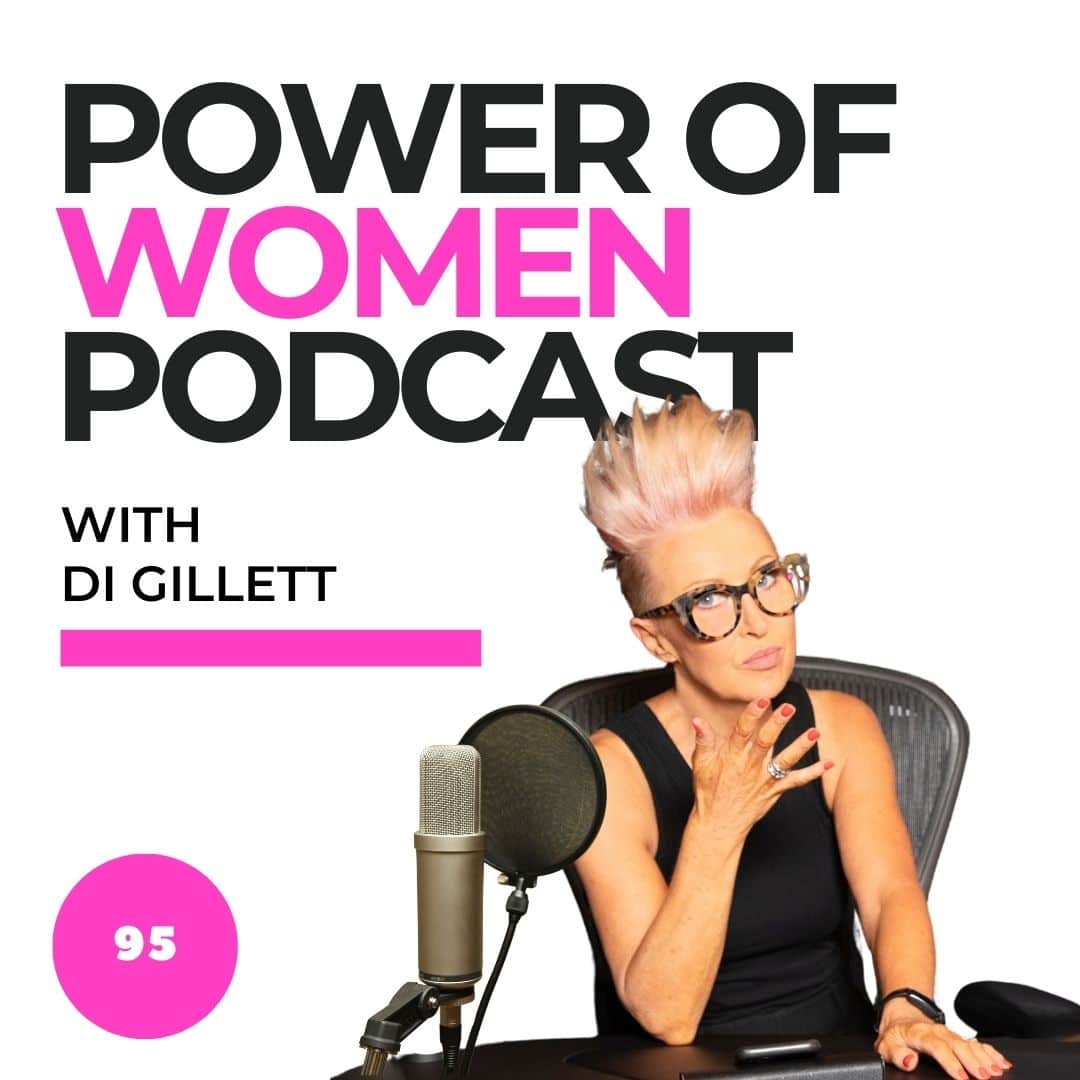FULL TRANSCRIPT:
CARLII LYON – [GUEST] (00:03)
Well, it’s a fear factor. Worry of how they’ll be judged. It’s, you know, there’s that idea of if I put my head, what’s the saying, if I put my head over the- the parapet. Yes, you know, I’m gonna be shot down.
DI GILLETT – [HOST] (00:25)
I’m Di Gillett and welcome to the Power Of Women Podcast. And what I love about this platform is the opportunity to showcase and celebrate the strength, resilience and achievements of women from all walks of life. And this is where the real stories are told and where we remind you to never assume. We talk resilience, reinvention and breakthroughs. Those moments that often don’t make the headlines but
absolutely should. So join the conversation and please subscribe wherever you listen to your favourite podcasts and be part of the power of women community.
What does it really take to be seen? Not just for what you do, but for who you are. Today’s guest knows a thing or two about visibility and what it really takes to put yourself out there. Carlii Lyon is a former international publicist who represented some of the most recognizable names in the world. From supermodel Miranda Kerr to bestselling authors,
and global brands like Microsoft and Volvo. Carlii has also just released her book, Courage to Be, the ultimate guide for anyone to step out from behind the scenes, embrace visibility, and live a bigger life. Carlii Lyon, welcome to the Power Of Women Podcast.
CARLII LYON – [GUEST] (01:57)
Thank you so much, Di. What a beautiful introduction. Thank you.
DI GILLETT – [HOST] (02:02)
You’re most welcome. Carlii, you have so eloquently described yourself as a high school dropout who started her PR agency at 21, which at that point is such a brave move. How did you start your business from that base and how did you build this incredible client base?
CARLII LYON – [GUEST] (02:26)
Yeah, well from dropping out of school or being politely asked to leave at 15. At 15? At 15, yeah. it was a school. I did everything. Everything you could consider a naughty teenager to do, I ticked it off the list. Like I was a high achiever.
DI GILLETT – [HOST] (02:40)
KARA.
You look like the picture of angelic behaviour.
CARLII LYON – [GUEST] (02:56)
⁓ thank you. Well, I hope my teenage boys believe that as well, but I promise I wasn’t at that point. So from 15 to 21, when you think of it, that’s a seven year gap of being out in the world. And my dad said to me when I left school, he said, well, if you’re not going back to school, you have to work. And the next day I…
started an apprenticeship as a hairdresser because I was determined not to go back to school. So I did go out into the world of work for quite a while as a hairdresser and I did waitressing and all of those wonderful things that you tend to do, you know, as you’re deciding what you want to do as a grownup. So that was a long time out in the world working. So it definitely wasn’t
You know, I see 21 year olds today that are coming straight out of uni and the idea of starting a business straight out of uni whilst there are definitely some that are brave enough to do that. I feel like because I had seven years out in the world, it made it a lot easier. It’s, it is a runway. It is a runway. And I always looked older than I was. Which made it. No, no, no.
Thank you. take that as a compliment. But in terms of how did I launch the business, I’ll give you a real abridged version. I had a gentleman who’s still my mentor today say to me, Kali, I think you’d be good in PR. And just based off that one comment, I did go and enroll to study PR and six months
into my study, I naively perhaps or bravely thought I can do better than even what my teachers sound like they’re doing because they didn’t really they weren’t very engaged or they didn’t seem that excited. And so I just went out and started building a clientele base. And before I even finished that diploma, I had my business.
DI GILLETT – [HOST] (05:12)
Wow. There you go. So yeah, I gotta say some of that naughty teenager had some real spice and some kick behind it. So well done.
CARLII LYON – [GUEST] (05:15)
Yeah, I was determined.
Absolutely. I think there is definitely a place in the world for a rebellious streak and not waiting, starting before you’re ready, doing the things that people tell you you can’t do. And I will also add at that point, I did have a big motivation to get out into the world and share the message of wellness because I had gone through my own personal transformation of
going from being a party girl and a rebel with no cause and doing lots of destructive things to being an aspiring health and wellness guru after I spent two months at a health retreat. So I did also have this real passion and fire to get that message out there. And I think when you have that passion, fire,
and you’re willing to just do whatever it takes. There’s real magic in that.
DI GILLETT – [HOST] (06:40)
Mm-hmm. what you’re talking about and what you’re specializing in now, but you established a reputation as a PR professional for building other brands.
before realising that you yourself were becoming invisible, something that has been put to me of late, I’m very interested in this one. I love talking about reinvention. Tell me about yours, because how did you realise that that was not working and you were disappearing as others were coming forward?
CARLII LYON – [GUEST] (07:19)
I didn’t realize how invisible I was or had become until I went on extended maternity leave. So I was out in the world, as you said, building other people’s brands for well over a decade and doing so many amazing things all over the world for these amazing people. Then I went on extended maternity leave and I went from having this global PR fast paced career.
to being at home with two babies under two, two beautiful boys under two. And I was so happy and felt incredibly privileged that I was able to do that. And it wasn’t until the end of that where my boys started to go back to, or started daycare, excuse me, and I started contemplating, okay, so what is my next step going to be?
It was at that junction where I thought, my God, really, through all of those years, I didn’t necessarily really nurture my, my network. I definitely hadn’t put myself out there in any constructive way. I even reflected on moments where I had been approached by the media, being this young woman in business, representing these amazing people.
Asked to be interviewed myself and I remember distinctly calling one of my clients and saying, I’ve been approached by this magazine, which by the way, media doesn’t generally reach out to you. You have to be the one reaching, which I think is an important point to make. And I called my client and said, do you, do you think I should do it? Do you mind if I do it? Like I was asking permission and almost validation from my clients. So.
That was the moment for me, Di, that I was like, my God, what am I, what was I waiting for? What held me back? Why didn’t I do that when I was clearly doing it for everyone else? What was it that I felt it wasn’t relevant to me? And in that moment, I just, suppose I realized, if I was thinking like that,
then I imagine a lot of people out in the world are feeling exactly the same way.
DI GILLETT – [HOST] (09:48)
So there’s a difference between visibility and currency. market, the market was saying you had currency because they, they were coming to you wanting to be interviewed, but you, you were challenging the personal visibility piece of stepping forward yourself instead of putting one of your brands out front and you do the behind the, behind the scenes work. Am I right in qualifying? Yeah.
CARLII LYON – [GUEST] (10:17)
Yeah, absolutely. Look, I always put it in the terms of I had a lot of positional influence. So just by proximity of working with the clients that I was working with, I had positional influence. And if I’m really honest, that did go to my head and it was a false economy because I thought, well, I’m influential because
I was getting all of the benefits of representing influential clients and how that shows up today for a lot of my clients that I’m working with who are not necessarily high profile. They’re not in that world of talent and entertainment. They’re executives. Yeah. But how that shows up for them, they’re working for some of the biggest brands in the world. And so they also have a lot of positional influence when they walk into boardrooms.
They’re bolstered up by the fact that they’re representing these huge brands. They are also operating in a false economy because it only takes for you to step out of that, which I did in maternity leave to go, ⁓ that was all based on my position. It wasn’t personal influence.
DI GILLETT – [HOST] (11:31)
Yeah.
Yeah. And it’s interesting because I often have the dialogue in individuals working in the consulting world who build their own portfolio, but under the auspices of a big brand. The biggest issue for those big brands is when those individuals become a brand within themselves, their organization. And then, you know, the
big banner over the door has to ask who’s walking through the door, the brand that they work for or brand personal brand. And that’s brilliant for the individual, but not necessarily brilliant for the organization who employs you. So it can happen.
CARLII LYON – [GUEST] (12:17)
Mmm.
Yeah, I think that’s a really fair statement. And I have definitely heard of cases where there is that sense of confusion where there’s an individual who’s really getting out there and doing things. And whilst they are working with a big brand, they’re becoming a brand themselves. And I understand that perhaps it’s something you need to be mindful of. But in my experience, it’s
Usually the opposite way is that the the individual is not doing anything and there’s it’s an anomaly for it to be the other way where the individuals doing so much that it becomes a problem. So there is obviously a need for mindfulness and understanding what’s the operating model that you’re working within you know I do know there are brands that they absolutely frown upon any form of.
self-promotion and personal brand. And I always say to clients and individuals, if you are going into that scenario, then you’re going into that scenario with open eyes. the ideal situation and mindset that I try to promote in the clients that I work with is I want them to start thinking of themselves as being in brand partnership.
with the brands they work for. So rather than it being a case of the brand, yeah, and the brands up here and I’m just this little cog in the machine. When you take that step of no, I’m in brand partnership with the brand doesn’t make you automatically the spokesperson for the brand, but it’s an energetic shift. And you start to realize that
DI GILLETT – [HOST] (13:53)
out.
CARLII LYON – [GUEST] (14:13)
And also start to be mindful of, how can I use this positional influence to my own benefit as well? Because you’re giving so much of your time and energy to the role, to the company. I think that’s only a fair part of the equation is what can you also leverage in, in that, in building the asset that is your personal brand? Yeah.
DI GILLETT – [HOST] (14:20)
Yeah.
Yeah, yeah, I love that framing of it. So you also write, and I think this is a direct quote, that when you have the courage to be seen, heard and known, we attract the right people, places and opportunities into our lives. So if that be the case, why does so many women and even the most accomplished amongst us struggle with being seen?
CARLII LYON – [GUEST] (15:09)
Well, it’s a fear factor. It’s a ⁓ worry of how they’ll be judged.
DI GILLETT – [HOST] (15:21)
It’s… It keeps coming up.
CARLII LYON – [GUEST] (15:22)
Yeah.
It’s it’s you know there’s that idea of if I put my head what’s the saying if I put my head over the. Yes, you know I’m going to be shot down.
Yeah, there, if we’re speaking specifically about women, there is this, they tend to be the ones who are more collaborative. And even I’ve seen, even just recently, what comes to mind is I was, I had the privilege of sitting in, in a boardroom session where there were a group of emerging leaders.
presenting to a group of senior leaders and their opportunity was presented to them to have a moment where they really, you know, were able to highlight their achievements and put the spotlight on what they’ve been doing. And it was a, there was a combination of male executive emerging leaders and also female. And I was sitting there quietly on the sidelines watching as this unfolded and the men got up.
and talked about their achievements and there was a lot of mention of I did this, my vision was this, et cetera. And then the women got up and it was, we did this, we did that. And there was no claiming their fame, no I. And I have to say when they left the room and then the senior leaders were reflecting and making their comments.
It does get noticed when you’re not confidently claiming your fame and owning your achievements. So whilst there might be a hesitation because, or, you know, I don’t want to be seen as the one who’s the tall poppy and I don’t want to be seen as big noting myself. There’s also negative connotations. If you are being so humble, you are coming across as being.
DI GILLETT – [HOST] (17:34)
Mmm.
CARLII LYON – [GUEST] (17:38)
you know, more meek and that’s not impressive.
DI GILLETT – [HOST] (17:41)
Yeah, it’s so true, Carlii. I told a story only recently of an organisation several decades ago where I had to go through a assessment centre to get in and there was about 30 of us in this assessment centre and at the end of the day, we’re all sitting around this massively extended boardroom table and we were given a topic and a couple of seconds to prepare and speak.
Hmm. 30 of us presenting and 29 of those individuals gave their presentation whilst seated in the position that they were seated at the table. I was the only one who stood up two decades or three decades ago, went and stood at the head of the table and presented with a level of authority from the head of the table.
and I was the only one out of 30 who got selected to join the organisation.
CARLII LYON – [GUEST] (18:46)
Amazing. You know that gave me goosebumps then. ⁓ really? Yeah it actually did because you know it represents something it’s so powerful and it’s so inspiring and for all the reasons why women don’t necessarily do it on the flip side of that when you do it like I’m sure
the 29 others, whilst there might’ve been a few that were like, God, who does she think she is? Cause there will always be a few of those. Without question, they exist everywhere. But then there would’ve been others in there that would’ve gone, wow, like I wanna be like her. I wish I did that. And you gave them permission to do that in the next opportunity. But it’s, that’s, I love that. I love that story.
DI GILLETT – [HOST] (19:16)
Without qu-
that all I wish.
We will come back to that point, Carlii, because there is a risk, as to the phrase you were referencing before, putting your head up above the parapet. But we’ll come back to that, because I think that’s an important point. But let’s talk about the three universal thoughts individuals struggle with on the line to putting themselves out there. You’ve clearly…
defined what those three universal thoughts. Can you talk us through that? And if they hold us back either from visibility or opportunity or both.
CARLII LYON – [GUEST] (20:17)
Yes. So I wrote an article about these three thoughts and this article on LinkedIn went crazy viral, like crazy, crazy viral. And I always say, I believe that article went viral to the extent that it did because everyone could see themselves in these three thoughts. And the reason I wrote the article and I wanted to put these three thoughts in black and white was I
started coaching individuals one-on-one. I realized they were all having these same three thoughts. But even more importantly for myself and my own sense of development, I had thought that these three thoughts were personal to me, that I was the only one thinking them. And when I realized everyone was thinking them, I thought, okay, I’ve got to get these out in the world because if we know that they’re just
thoughts that everyone has we don’t take them so personally and we can override. The impact that these thoughts have okay so here they are. The first one is who am I to speak and this comes from a place of us being completely unable to see ourselves truly objectively and the things that we know the things that we’ve done.
The person that we are, we don’t necessarily value to the same extent as what we do when we look at others or we hear about what others are doing. So this, am I to speak? Everyone feels the same. And this thought is in the minds of some of the people that you would never assume. Like that have got all the.
accolades and all of the not accolades, excuse me, credibility is the better word, but they still think that they shouldn’t speak. The next one is I’m not saying anything new. So why would anyone care? And this is especially relevant when people start putting themselves out there and sharing their thought leadership and their stories. There’s this sense of, well, if I’m not saying anything new,
And groundbreaking and never heard before then it’s irrelevant no one will care and. You know if and i’m sure a lot of your listeners are avid readers if you happen to. Especially in the non-fiction realm if you happen to follow a particular topic so in my case i love researching about influence and body language and these sorts of subjects.
And the honest truth is, Di, everyone’s saying the same thing, but they’re just saying it slightly differently through their own tone of voice, through their stories in, you know, in their realm of experience. But they’re all saying the same thing. So if ever you’re questioning, I’m not saying anything new, so why would anyone care? I want you to think of your favourite non-fiction book.
And imagine, imagine if that author had have held themselves back by thinking that. Like it would, the world would miss out on that. And then the last thought is everyone will think I have a big ego. So this worry of, you know, if I put myself out there, people are going to be thinking, or who does she think she is or who does he think he is?
DI GILLETT – [HOST] (23:50)
You
CARLII LYON – [GUEST] (24:01)
And yes, like we just said, those people absolutely exist in the world. But my experience tells me that those people are just so afraid of putting themselves out there that when they see someone else do it, it makes them intimidated.
DI GILLETT – [HOST] (24:19)
Those points are absolutely brilliant. So I reflect back to the 30-something year old who stood up at the head of a boardroom table and landed themselves a job by being bolshe. And I don’t know whether I did that in a considered sense or it was just an innate thing that that’s what I did. And I think it’s more the latter than the former. Only very recently,
coming to the realization through somebody poking the bear that I needed to be more visible as a brand to promote the Power Of Women Podcast. In so doing and putting myself out there, all three of those things enter my mind at some point in time every week.
CARLII LYON – [GUEST] (25:10)
Yep.
DI GILLETT – [HOST] (25:11)
with all the confidence in the world, I still reflect on those points.
CARLII LYON – [GUEST] (25:17)
Yep, they are universal. And my favorite author, Steven Pressfield, who wrote an exceptional book called The War of Art. He talks about how in the universe there is a force that he calls the resistance and the resistance exists in the universe to stop us from doing the things that we’re meant to do, from being the person that we truly in our heart and soul want to be.
DI GILLETT – [HOST] (25:28)
Yes.
Yep.
CARLII LYON – [GUEST] (25:47)
And so I see these three thoughts as a form of resistance now. And when you
almost create a bit of distance and you can hear the thought pop up and know that it’s just resistance. It’s everyone feels like this. Every single person that you see out in the world at whatever level they’re at, they are having the same thoughts.
DI GILLETT – [HOST] (26:17)
Maybe it’s a saline-relating dose so that we don’t get too gushy. Maybe.
CARLII LYON – [GUEST] (26:23)
Maybe. Yeah, absolutely, maybe.
DI GILLETT – [HOST] (26:28)
Whether
it’s fully on or just slightly on.
CARLII LYON – [GUEST] (26:31)
Yeah, maybe it will stop us from all becoming crazy egomaniacs who think that we’re too god-like and do everything.
DI GILLETT – [HOST] (26:42)
A few
people I could name globally who might not have these thoughts that we could run. It is, so maybe it is. So you encourage readers to embrace the life-changing magic of, of I, and it doesn’t escape my notice, Carlii, that you have two I’s in your spelling of Carlii. So my first question is, have, did you always, was that the name you were given?
CARLII LYON – [GUEST] (26:47)
Maybe.
DI GILLETT – [HOST] (27:12)
and the second it wasn’t you that
CARLII LYON – [GUEST] (27:14)
No,
was not the name I was given. consulted with a… I mean, this was in my 20s. I consulted with a very well-known… I asked. Yes. I know. It’s funny, the other day I was walking with one of my closest friends, and she’s a newer friend in my life.
DI GILLETT – [HOST] (27:31)
Do this.
CARLII LYON – [GUEST] (27:44)
She never knew that I changed my name. She was like, I never knew this. How could you know? So it’s a good pick up die. But I did, I consulted with a famous numerologist who unfortunately has passed away and he was known as a numerologist to specialize in names because in terms of the world of numerology, everything can be… ⁓
It can turn into a number. all of the letters. Yes. So I don’t know if you know much about numerology. When you look at your name in total. ⁓ okay. Perfect. So I had my name done and I changed. I was born with Carlii with a Y. So I did add the two, I’s and I changed my middle name and my surname.
DI GILLETT – [HOST] (28:16)
Yeah.
and your surname. ⁓ There’s the rebellious kid coming back. How did that go down? How did mom and dad services, this is pre-marriage or post-marriage?
CARLII LYON – [GUEST] (28:44)
I’m
This is pre-marriage.
DI GILLETT – [HOST] (28:55)
How
CARLII LYON – [GUEST] (28:57)
Well, Lion, so my mother’s maiden name is Lions with an S. He dropped the S because apparently that was not good for the numbers. So there was still a nod to mom and dad. My dad was upset in the beginning that I had changed, but he soon came around.
DI GILLETT – [HOST] (29:02)
Yes. Yeah. Cause I was also good. Yeah.
Yeah.
Yeah.
CARLII LYON – [GUEST] (29:25)
Old school and he’s has an Italian background. And then what was funny is I married an Italian and even though in Italy women don’t change their names. My husband was a little bit more old school and he did want me to take his name, but I didn’t. So I know. So every time we’d go to a wedding, he’d be like, see, she took their name or blah, blah.
DI GILLETT – [HOST] (29:44)
Bye!
CARLII LYON – [GUEST] (29:52)
So it took him a while to get his head around it. you know, I am a personal, obviously a personal brand. I live and breathe personal branding and my name is my name. Like it’s my name, it’s my identity. So I couldn’t imagine changing it even for marriage.
DI GILLETT – [HOST] (30:09)
Yeah, they go. And as I say, I’m so glad I asked you that because every time I put your name down, think must remember to ask Karla. Because the point of distinction is a powerful one. And I got married at ⁓ 40 years of age also to a European whose surname was far more renowned in the public domain than mine. But I didn’t.
Yeah. ⁓ Sorry.
CARLII LYON – [GUEST] (31:01)
Okay, perfect.
You can lean on it then. can use it. That’s even better. You’ve got two options now.
DI GILLETT – [HOST] (31:09)
Yeah,
so there you go. So I’m talking with former international publicist, turned speaker and executive coach Carlii Lyon, Carlii with a double I. And coming up, we’re going to talk about putting yourself out there and trusting your intuition. If you’re loving the Power Of Women Podcast, be sure to jump on to our YouTube channel.
and hit that subscribe button to ensure you never miss an episode. Carlii, you talk about future self-psychology as a powerful concept based around imagining who we want to become. Could you tell us a little bit about what future self-psychology is and how we use or can use this framework to shape our personal brand?
CARLII LYON – [GUEST] (32:03)
I didn’t even know that future self-psychology was actually an area of psychology and there are a few key pioneers in this space and when I first came across the research and the thinking, quite frankly, I was just blown away and it made so much intuitive sense which
You know, which is why you barely even really need to explain it. But in a snapshot, what future self psychology is, is using the power of perspective and even in some ways, your imagination of thinking about your future self and using that to your advantage. So I’ll give you an example. There is a gentleman by the name of
Hal Hirschfield, who is a professor at UCLA and he did a TED talk on this and a lot of his work centers around this idea of future self-psychology. And in his case, he’s talking about how it impacts decision-making and behavior. And what he did in one of his research studies was he got a group of students together. They were all given a digital avatar and invited to go into a virtual reality.
And one half of the students was given a digital avatar that looks like who they were today. And the other half of the students were given a digital avatar that was digitally enhanced to look like who they would be in 40 years time. so you see in his Ted talk, he actually shows clips of these students going into this digital realm and looking at themselves in the mirror.
And at the end of their journey, they had to come back, sit down and answer some questions. In this case, it was around financial decision-making. And what they found was that the individuals who went in and saw themselves effectively in 40 years time, they committed to saving, I believe it was 20 or 30 % more.
Then the individuals who went in and just saw themselves as who they were today and in the moment. So it’s this idea of when you truly embody the concept that your future self will be an entirely different person and that the consequences of everything you do and you don’t do in the now are going to ⁓ impact that.
other person, then your decision making is potentially going to be different. I certainly think better because you do realize that, okay, I’m creating that future for that person who I’m not at the moment, but that person’s going to live the results of every decision that I make. And when it comes to personal branding and making the decision of
putting yourself out there, building your profile. In the now, you know, it can be a hard ask because people are busy. They’re already thinking about just doing what they have to do. And then when you put it to them that, okay, on top of that, you have to go and network. You have to share your thought leadership.
You you
DI GILLETT – [HOST] (36:06)
I know!
CARLII LYON – [GUEST] (36:14)
You know i want you to imagine you’ve been offered this amazing opportunity it’s going to give you massive visibility it’s something you’ve never done before and you’re questioning whether you should do it and in the now you’re thinking am i ready should i do this can i do this. I want you to imagine what would your future self say to you at that point when you’re making the decision and every single time it gives the audience.
Goosebumps because every single time it will be something so simple, but yet so profound. It’s just like, go for it. Just do it. You’ve got this. And to me, it just shows that we have this mentor in us that we can use and tap into anytime.
DI GILLETT – [HOST] (37:04)
Yeah, thank you. That’s brilliant. I love that. And do you know, I’m sitting here listening to you talking about this and envisaging future self. And sometimes I have to wonder whether I’ve done a lap of the planet before because I find myself doing things innately and then I learn about what it is that I’m doing after I’ve already done it.
Mm-hmm. Mm-hmm. Yes. ⁓
CARLII LYON – [GUEST] (38:01)
Mmm, I love that. Yeah. Well, that’s a good thing. It’s like confirmation.
DI GILLETT – [HOST] (38:07)
Yeah, that’s right. Yeah. And it’s, it’s something that leaves me feeling very positive. thank you for clarifying future self psychology. And this probably leads very much into that as a next step and intuition and I call it my inner intelligence and and and something I tap into very regularly. ⁓
CARLII LYON – [GUEST] (38:16)
rhyme.
DI GILLETT – [HOST] (38:35)
And I think some people, as we might suggest from the prelude to this question, ⁓ are more naturally attuned to the subtle cues. how does somebody who’s not learn to listen to their intuition and then channel it into what really matters?
CARLII LYON – [GUEST] (38:55)
Hmm.
Intuition has been, so my goal for this year and, you know, through the process of launching my book and doing all of these effectively new things, my biggest goal was listen to my intuition, really trust my intuition and take action on my intuition. And in doing that and consciously doing that this year,
I can say with a sense of authority that it really comes down to practice. And in terms of how, for me, it’s sitting still, being quiet, creating those moments of calm. So even I’ve started, instead of getting in the car and automatically turning on music,
I don’t turn on anything. And I, for me, that’s creating a moment, almost like setting a stage for my intuition to come in. That’s been my experience that the quieter you are, the easier it is to hear that little voice. And for different people, they’re going to experience their intuition differently.
DI GILLETT – [HOST] (40:09)
I like that.
CARLII LYON – [GUEST] (40:27)
And I would say for the people who perhaps they’re new to the idea, and I am thinking that a lot of the people that are listening are probably not so new to it because I, and this may be a grand overstatement and stereotype, but I feel like women are at being intuitive.
DI GILLETT – [HOST] (40:48)
really good
CARLII LYON – [GUEST] (40:52)
And we hear our intuition, we’re in touch with our intuition, but whether we act on our intuition, that’s another thing.
DI GILLETT – [HOST] (41:00)
sufficiently yeah yeah
CARLII LYON – [GUEST] (41:02)
Yes.
And perhaps it’s just in that case, the practice is not necessarily learning to hear it or learning to listen. It’s learning to just take action. So I’ve got to the point now this year because it was my goal. It was a front and center goal for me. If my intuition tells me to send an email to someone, follow up someone, go to a particular event, I’m just going.
Like I’m not even questioning and I have to say I’ve had some really remarkable things come through as a result of doing that.
DI GILLETT – [HOST] (41:41)
Was it unnerving to start with? Did you have to step out of comfort zone or was it simply taking action?
CARLII LYON – [GUEST] (41:52)
I wouldn’t say it was unnerving because it’s always been something that I’ve appreciated. I would say it was more come really actually comes back to what you just said in terms of confirmation. Like you’re doing certain things or not doing certain things. And by making it front and center, I confirmed to myself not only how important it is.
to listen and take action, even when it doesn’t make sense. But I also confirmed to myself how sometimes I really wasn’t listening and I was not trusting it.
DI GILLETT – [HOST] (42:35)
Yeah, great. So are you going to say something else then, Carlii?
CARLII LYON – [GUEST] (42:41)
No, I was just going to say how this and why I put this in the book was when it comes to personal branding. I think having that close connection with your intuition is so important because what I find is a lot of the time when someone first starts to put themselves out there and perhaps this this even mirrors how we develop as beings as humans.
In the beginning, we’re really looking around us to see what is everyone else doing and what can I mimic and how can I imitate and, and, and maybe that’s natural because then we go through our teenage years and we go, okay, I take this, I take this and I’ll change this. But when it comes to personal branding and putting ourselves out there in the beginning, it’s really tempting to just go, ⁓ but that’s how they’re doing it. So I’m going to do it like that. Or, you know, I want to do this, but maybe that’s wrong.
because no one else is doing it. And that’s where I think intuition plays such a dramatic role in just trusting that experiment with that, you know, maybe put something out there.
DI GILLETT – [HOST] (43:55)
situation tells me where that white space is is where you should go. Yes. ⁓
CARLII LYON – [GUEST] (44:00)
Exactly. That might be your edge. by doing when, you know, when everyone’s zigging and your intuition is saying you should zag, it’s probably great advice.
DI GILLETT – [HOST] (44:12)
Yeah, yeah, I love it. Well, Carlii, finally for the woman today thinking about stepping forward and they’ve got some hesitation around that. What does putting yourself out there with purpose really look like in everyday life? Is there an example that you could play out for us?
CARLII LYON – [GUEST] (44:35)
Yes, absolutely. Whenever you start to contemplate what you want your personal brand to be and how you want to shape your personal brand, a lot of clues in how to do that can actually be borrowed by some of the biggest brands in the world. And you can really lean on some traditional frameworks of brand marketing in
My case or what I speak about often is the four P’s. So the four P’s, are definitely for anyone in marketing, they’ll be familiar with the four P’s or this version of them is promise, packaging, position and promotion. So even if you sat down with a blank piece of paper and you put four circles on the page and you have promise, packaging, position, promotion.
promise is, what do you stand for? What do you want to be known for? How do you want to be remembered? And the really simple way of getting to that is, what are perhaps three words, ideas or phrases that you want people to automatically associate with you? That’s your promise. That’s the thing that you want people to automatically think of when they think of you. Once you’ve got that promise,
You can then shape and color the other parts of the puzzle. So you’ve got your packaging. Your packaging is not only how do you package yourself in person, so your styling, you know, your styling decisions, but also how you’re packaging yourself online. That’s your social media. So it’s really looking at every touch point, how am I packaging myself and what am I signaling?
in doing so, how am I dressing? What colors am I using? What words, phrases? So that’s your packaging. Your positioning, when you think of positioning in the world of brand marketing, we know that brands make sure that their products are on the right shelf in the right place because it will have a huge impact on how a customer receives and relates to that product. The same thing is for an individual.
Your positioning is not only potentially where you work or what industry you play in. Your positioning is what events are you going to? ⁓ If you are a thought leader, well, what platforms are you using? This is all shaping how people see you and what they associate with you. And then the last piece of the puzzle, which I think is the most important, is promotion.
Most people fall into the trap of thinking, if my work’s good enough, people will see it and that will be the end of the story. But we know in brand marketing, the biggest brands in the world are the biggest promoters in the world. They’re the biggest advertisers. Why? Because they know they have to stay top of mind. They have to stay relevant. They know that people’s attention spans are short. They know that they have to constantly
be reminding them of the brand. The same thing applies to our personal brands and not making the assumption that everyone’s thinking about you. Everyone sees you. Everyone knows what you’re doing because they don’t and psychology supports that statement. So I would start with that blank piece of paper. What are your four P’s and just look at, look at that as a starting point.
because that might shift your
DI GILLETT – [HOST] (48:26)
Masterclass. Yep. Thank you. And I, I personally have learned a lot, crossed a few things off and validated a few things that I’m doing just through the course of reflecting on exactly, exactly what you’ve said. they’re absolutely powerful points, Carlii. So, so thank you so much. Carlii, what a brilliant
CARLII LYON – [GUEST] (48:44)
Amazing.
DI GILLETT – [HOST] (48:52)
episode today and it will be one of our closing episodes of the year. So I think what I would ask anybody listening to this is to play this over a couple of times. Take down the point. This is a bit of a masterclass over your Christmas break if you’re going to give yourself one to stop and reflect about how you are managing
yourself as a brand, whether it be that you want to step forward into your own business, you want to elevate yourself within the organisation with which you are, or you might be pursuing some purpose-led perspective that you’re embracing as a next stage in your career or your life. So Carlii, thank you so very much for that. And your book Courage To Be is out on the shelves now.
CARLII LYON – [GUEST] (49:52)
It is, thank you. Very exciting. And I just want to say, Di, thank you so much for having me and thank you for putting yourself out there in what you’re doing. And as you mentioned, how much work goes into even this podcast and each podcast episode. I know that you’re doing it for a very big purpose and that every woman who listens to it.
is benefiting from that. So thank you for allowing me to play a small part.
DI GILLETT – [HOST] (50:24)
Thank you, Carlii. That endorsement means a lot and it makes me feel a little bit emotional. So thank you. Thank you so much. Please be sure to jump on to the show notes and there you’ll find where to find Carlii if you’d like to pursue a direct conversation. And I know you show up as I do quite regularly on LinkedIn where we’re LinkedIn fiends. That’s a really good spot.
to find either of us. Carlii, just for ⁓ edification, your website is…
CARLII LYON – [GUEST] (51:04)
CarliiLyon.com
DI GILLETT – [HOST] (51:06)
Carlii, thank you again. It’s been an absolute privilege to go through all this. Thank you. So enlightening personally. So I know how enlightening it will be for our listeners. Until next time.
CARLII LYON – [GUEST] (51:12)
Thank you.
